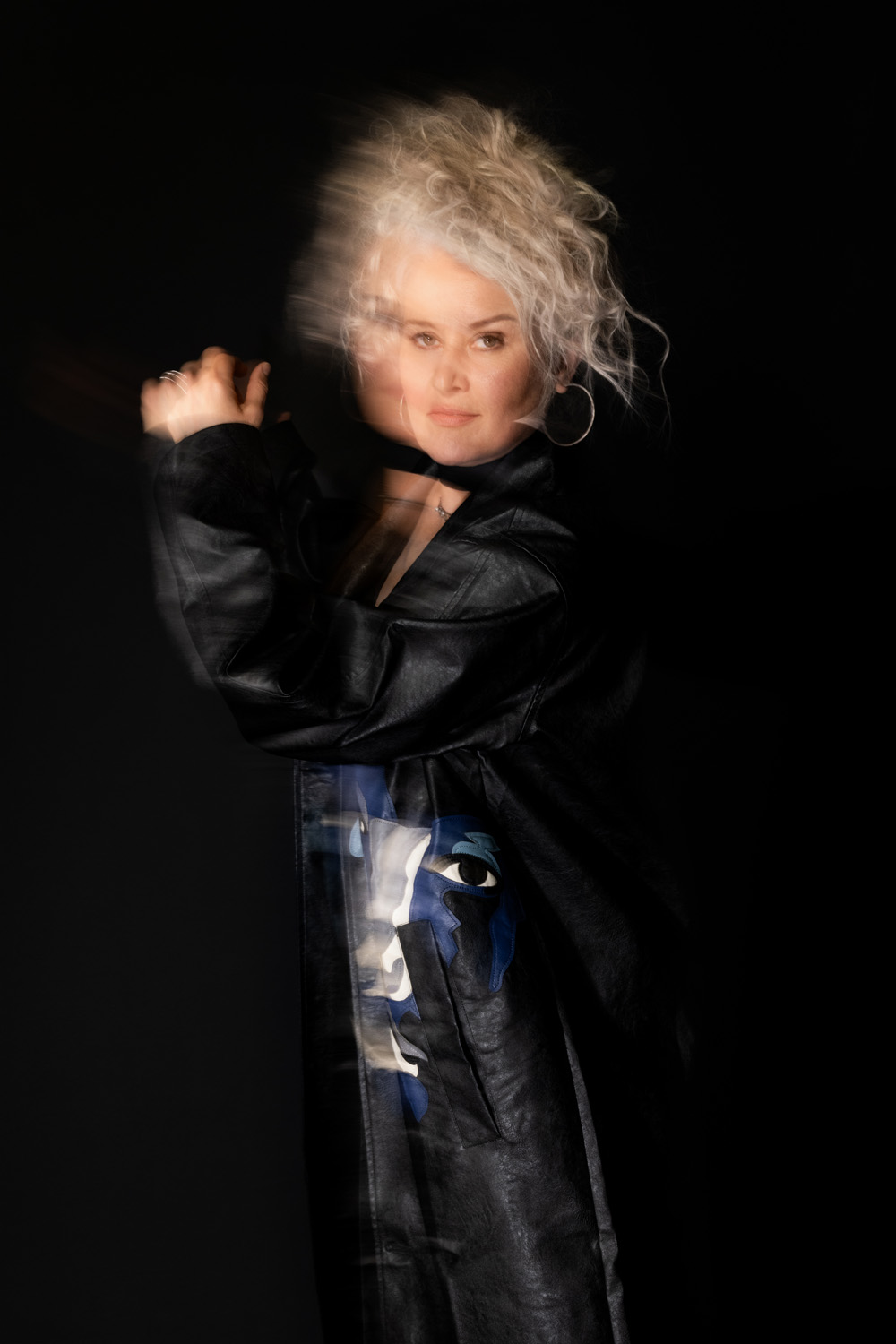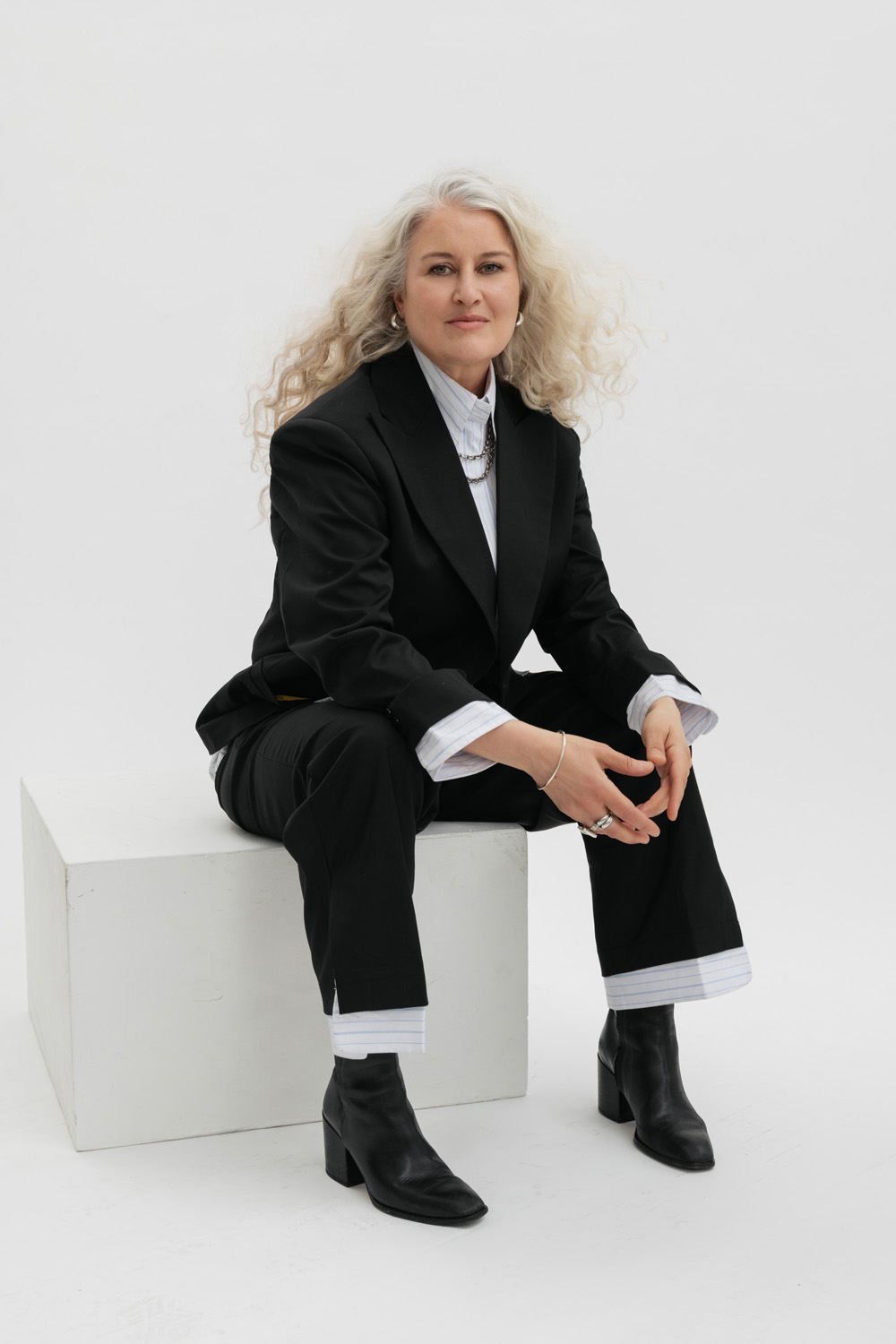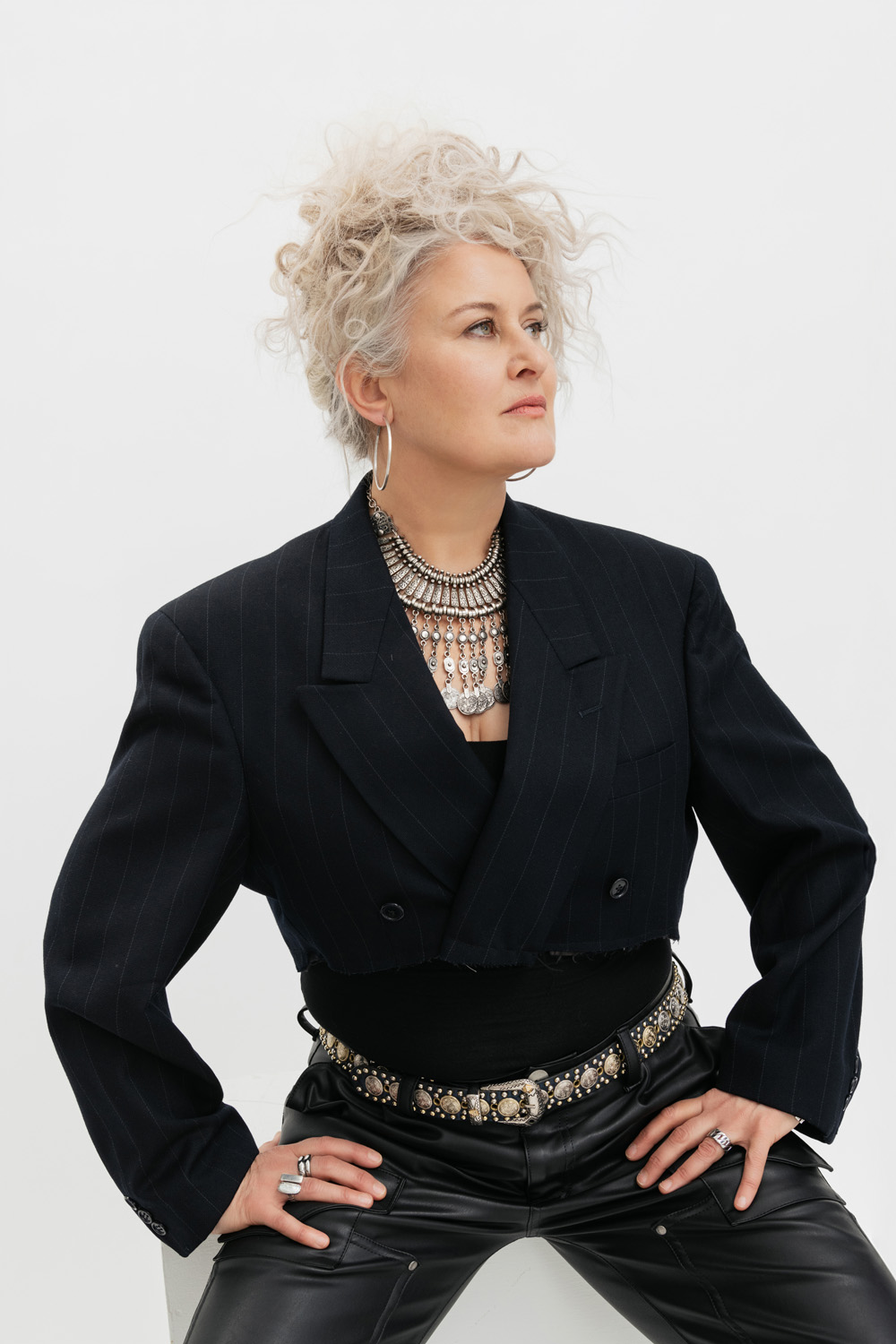
Vintage Dior Blazer, reworked by Casa Lizarraga Photo 0406E Vintage Dior Blazer, reworked by Casa Lizarraga Jewelry, vintage collection of Claire Mermelstein @la_petite_clair
“Be brave. There is the trying and there is nothing else.”
Paula Cole has spent the last decade enmeshed in the foundations of American culture, singing her way through American classics in several cover albums. Now, at 56, she channels her lifetime of craftsmanship and her deep engagement with Americana in a new original album Lo, a set of songs as gentle as they are powerful. They draw from her life and poetic spirit, as well as from her urgent messages to the world– pay attention to climate change, love each other. While political action now seems extra-paramount, Lo is far from Cole’s first foray into social justice. In the 1990’s, Cole’s “Where Have All the Cowboys Gone?,” a satire on gender roles, was widely misunderstood by the public as a rather dramatic love song. In these new songs, there’s no mistaking the unwavering, whistleblower stance Cole assumes– this is the voice of a woman who stands firmly, with the confidence of a thus far decades-long career, and with faith in new decades to come.
In the opening song of Lo, you repeat that you’re “seeking the truth”– the solution, in the song, seems to be to “follow the moon.” What truth do you feel you seek/sought in this album?
I must be honest with myself, and honest in my songwriting. “Lo” is truthful. I’m revealing my inner feelings and psychology. Songwriting is a therapeutic process. It aids me in finding my deeper thoughts, problems, and revelations, bundling them into poetry and then melody, chords, groove. It becomes this whole creative ecosystem, and every part of it is important.
Now, after its release, what were the most important things, to you, that you expressed in this album?
My favorite songwriting is highly autobiographical – I love the artists who share the core of themselves, because they shine a light on my own path. I love Tori Amos for writing about her most vulnerable experiences. I look to those very few artists who dare to do this over their long lifespan. I want to hear about their life at 28 and at 58 years old. The artists that continue the autobiography through song help others, and they give me courage to keep doing what I do.
Listening to Tori’s “Ocean To Ocean” album has supported me in my anticipatory grief in the inevitable event of losing my Mom. My Mom is getting older, she has serious health problems now. I wrote “Follow The Moon” when she was having a particularly hard passage. In these lyrics, I ultimately follow my own inner guide, just as migratory species follow theirs. It sets up the album to be a sequence of revelations because I am on an inner journey.
How did it feel to get back to songwriting after many years? How was the experience of creating music different now, versus for example, 7?
It feels very much the same, honestly. But I need time. I need solace and silence, few distractions. Logistics, details, caring for others, chores, noise, interviews, emails, etc. – those things are vectors of interruption, enemies to focus, and the long thought waves required to go within a meditative, creative process of writing. When I wrote the songs for “7” I had knee surgery, was on painkillers for a brief spell, in a wheelchair in the house, on medical leave. I had few distractions and the songs flowed. I love that album, it’s very raw organic and personal. Writing songs for “Lo” came when my kids were in college, away from home. I had time to myself. I was listening to Jason Isbell’s music a lot. He dares to express poetic, naked autobiography. So I was going to meet with Jason for a recording session in Nashville – we needed a song. I wrote “Mother, Son and Holy Ghost” for us and John Paul White. They are incredible artists, the bar was high and I needed to prepare something good. Of course, they made it better with their contributions. But it sparked a steady stream of consciousness of many songs. They just kept coming. I think I was holding a lot in. On “Lo”, I am speaking of things I’ve held in for years as I’ve worked and mothered, and I still have a lot to say.
You’ve compared yourself to the tortoise in the fable of the tortoise and the hare. How does Lo factor into your progress as an artist– how does it stand– as a milestone, a turning point, a trophy– in your path as an artist?
It is the milestone of a woman who has endured traumas and lived a lot of life, and she is sharing realizations softly and wisely, not angrily. I think “Lo” is wise and deep.
You’ve talked about how you “worship music” and the topics of religion and sacred worship come up in this album. What are the things/people you hold most sacred in your life?
I hold my primary relationship with David, my husband, most dear. He is my rock. We survived our divorces and raised our blended family together. He still loves me at my worst and he champions my redemption. Of course, my daughter Sky is my heart. Sky just graduated from NYU Film School and aims to direct films and/or children’s television. I am increasingly close to my beautiful stepdaughter, Eva James. We are working on her debut album together, it is gorgeous, and I’m proud to reveal it to the world soon.
My stepson, Faolán, has just graduated from Berklee College of Music and will be working as a sound engineer, I’m so proud of him. I know I don’t have much longer with my parents so I cherish them as best I can while balancing work. And of course, I have a few precious friends that I couldn’t be without, my sister Irene, especially. People first. I don’t even think about things unless you count a home. I love my home. The nature and wildlife surrounding us inspire me deeply. Nature and love are “god” to me.
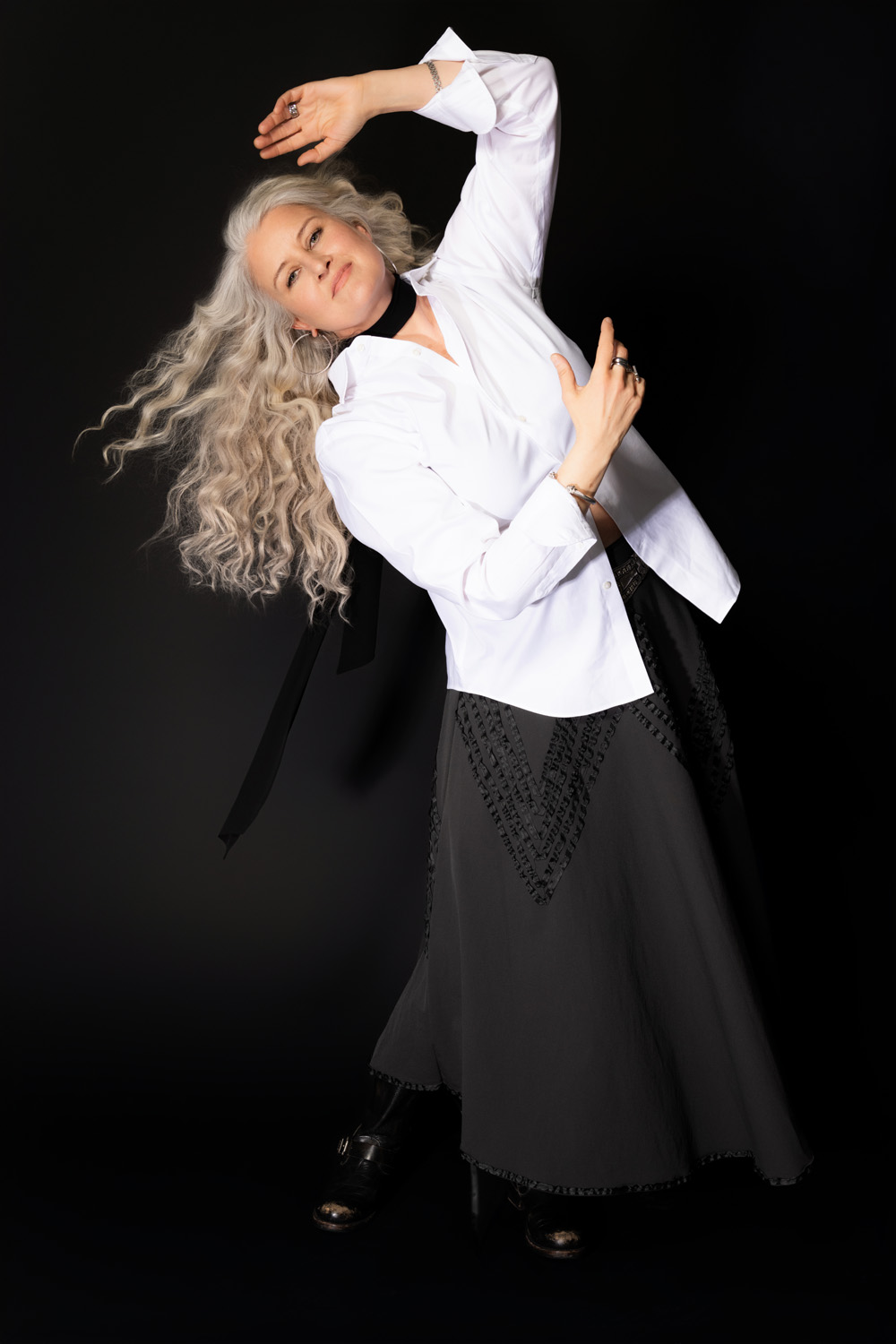
Cotton Uniqlo Shirt, Casa Lizarraga Skirt and Paula‘s favorite boots
Kidsuper Leather Coat
Themes of American society and culture have been present in your music for a long time– how did grappling with these ideas through your standard albums like American Quilt change, expand, or emphasize your thinking about those themes? How did your covers albums influence Lo?
Throughout recording “Ballads”, I thought about the lack of women’s voices in the great American book of standards. The vast majority of the standards I’ve learned over my life are written by men. Many of their lyrics ring hollow for this woman singing them. The lyrics of The Great American Songbook drove me away from singing jazz, provoking me to write my own. I can only think of “Willow Weep For Me” by Ann Ronnell and songs by Billie Holiday as compositions by women. It was important for me to honor those singular voices. On Ballads, I wanted to cover artists who were so important to me and to so many: Miles, Coltrane, Billie, Chet Baker, Bobbi Gentry, Bob Dylan, Nina Simone, Sarah Vaughan, and Nancy Wilson. I noticed a lot of my favorite work comes from the 1930’s and the 1960’s – eras of the Great Depression, heartache, societal upheaval, war, and poverty. From these times of societal purgatory flows such deep art.
I became more focused on the shameful American history of enslaved people when recording “American Quilt”. The folk, blues, country, and standards comprising the album became a patchwork, a proverbial quilt. Our country has melded immigrants with indigenous, with enslaved peoples. It is a turbulent and brutal history and it is in the music. Our historical folk songs span genre (German hymns sung by sailors over centuries on ships, then mixed with Appalachian culture, or pentatonic African melodies transported to America, manifesting as blues or gospel, and gospel songs and quilts serving as directives to freedom – whether that be to the Underground Railroad, to allies, to heaven or Jesus.) I wanted to acknowledge the power of the gospel and the quilts, so I wrote “Hidden In Plain Sight” as a connector to the folk songs across “American Quilt”. All of this listening, research, and composing enriches me and gives me time away from the pétri dish of introspection in my autobiographical songwriting process. I come back refreshed. I think that time away from writing autobiographically fortified the new songs on “Lo.”
You have been outspoken about war and political issues in the past. What issues are most important to you today? What truths do you believe in, that you want people to know?
I know I am so blessed to have a safe place to live on this planet. I’m so lucky to be here discussing the troubles of the world, not living them. My worry is epic. I can’t sleep when I think of the Anthropocene. I worry about Sumatran orangutans, and African elephants at 4 am. I believe it’s the demise of man to regard ourselves as. the culmination of evolution, as if we are some superior species. What a crock of shit. We have so much to learn from other species – they possess other forms of intelligence that we don’t perceive. We are a continuum of evolution, all species connected, all important. We are so out of balance, so overpopulated as Homo sapiens, eliminating other innocent species in our lifetime alone, with our hubris, greed for fossil fuels, for eating animals (creating apocalyptic scenarios for farm animals), to giant Agriculture with mono-crops utilizing pesticides killing our pollinators, poisoning the food chain? It’s insanity – we’re devastating biodiversity, changing the base temperature and the climate of the earth to a point of no return.
Several species are the harbingers, the doorways to a point of no return, as they teeter on the brink of extinction starting with the vaquita porpoise in the Gulf Of California, the white rhinoceros, untold plants, and fungi. There are significantly fewer birds on the planet now than when I was a girl. With every species‘ loss, we lose our ability to live in a stable world where plants give us medicine, pollinators give us food. For god’s sake, just go vegan. It’s the most radical act of change for good. I’m not perfect. I fail, but I keep trying. Going vegan is the best thing for the planet’s climate, for wildlife who need habitat, for countless animals trapped in cruelty, for your heart, your health span, your lifespan, and your consciousness. Try it for one day a week, and then see if you can go longer. I’m heartened to see more consciousness around véganism in my lifetime but we have to change much more rapidly. Deterioration to the earth’s climate will only exacerbate the loss of fresh water and food supply, creating more suffering, refugees, and wars. We can start with ourselves in our bodies right now – we can start with not eating animals, not eating suffering. Think of the “P’s” we need to stop:
PROHIBIT
Petrol!
Plastic!
Pollution!
Pesticides!
And that is but one point on my enormous soapbox!
You have also been a prominent feminist in the music industry. There is much discourse on the state of gender equality in the US today, with the overturning of Roe v Wade and online misogyny. How has your experience with feminism and fighting for gender equality changed throughout the years?
“None of us are free until all of us are free.”
I did a deep research-dive on feminism in the 1960’s with Betty Friedan and rock star, Florence “Flo” Kennedy. Flo Kennedy was one of the greatest feminists who ever lived, and hardly anyone knows her. She was the first black woman at Columbia Law. She coached Gloria Steinem on how to respond to the haters. Her legal arguments for safe, legal abortion in the New York courts not only secured safe, legal abortion in the state of New York, but they went on to support safe, legal choice for all women across America. I look at the astonishing bravery of the early wave of women Baby Boomers and I think we’ve recessed.
Of course, a lot of those Boomers marching for women’s rights in 1969 also marched against the Vietnam War and marched for Civil Rights. The strength of change lies in intersectionality. The second-wave feminists brought intersectionality to the forefront of consciousness and it was responsible for much of their success. Gen Z is keenly reminding us of this! We need to be inclusive of all our brothers and sisters across minority and oppressed populations, whether they be in Palestine, Afghanistan, and Somalia where women’s rights continually erode, in the LGBTQ+ community, amongst people of color, or women who are losing agency over their own bodies in American Red States where largely old, Caucasian men are making decisions for a female person’s bodily rights and health care! Women are losing basic human rights. In America! None of us are free until all of us are free!
What is the meaning behind the album name Lo?
I just like it. I like the sound of it. I like the simplicity of it. Lo simply means, ‘here it is’. And here I am.
If you had advice for younger artists, what would it be?
Be brave. There is the trying and there is nothing else. Embrace your eccentricity – it sets you apart. You can have a great career without hits. Aim to make great art over a long and meaningful love-filled life.
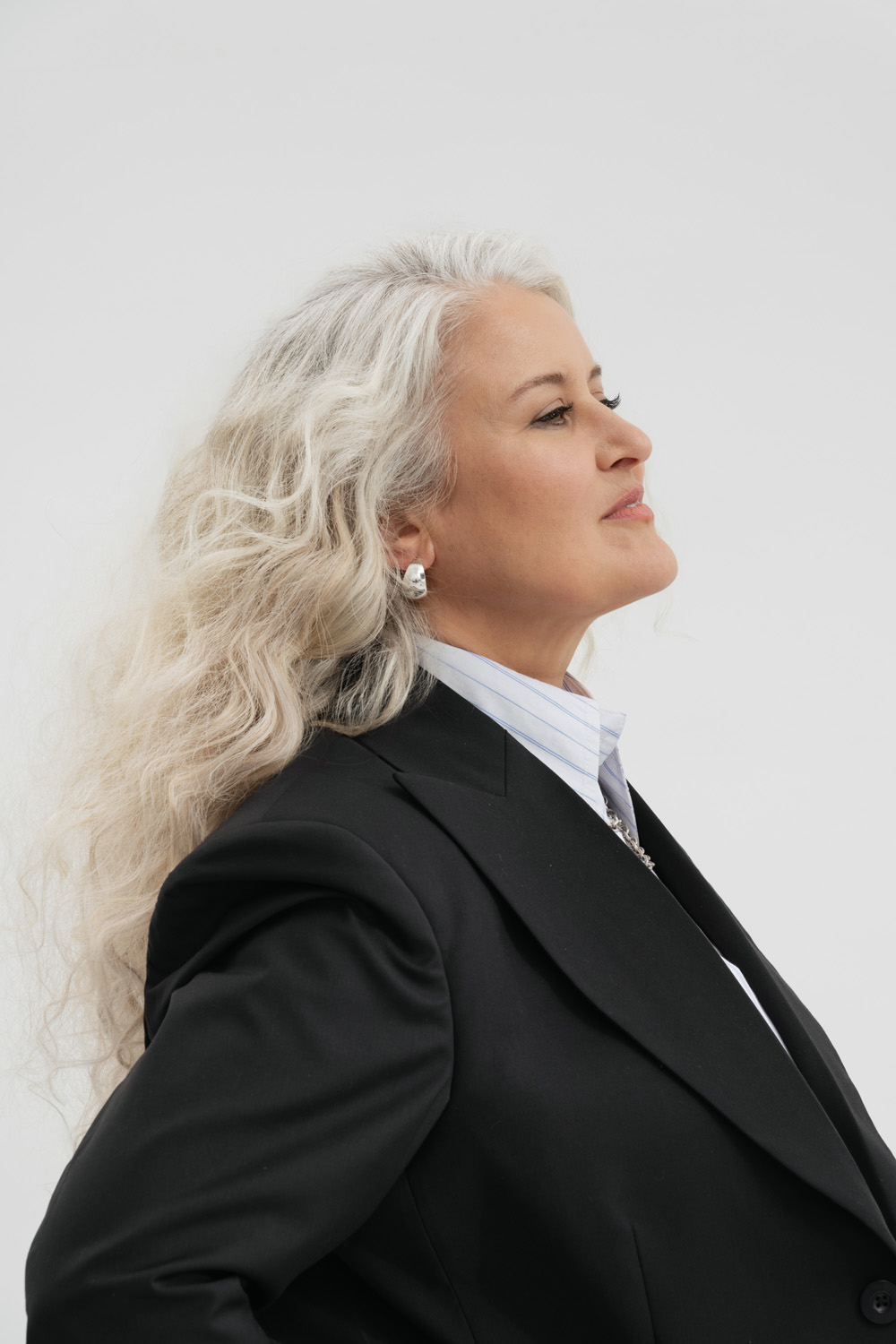
Kidsuper Blazer and Pant Suit, Aeyde Shoes
Story: Joann Zhang
Photos: Jena Cumbo @jenacumbo
Styling: Cecilia Lizarraga @cecilializarraga
Makeup: Nana Hiramatsu @nanahiram
Hair: Hide Suzuki @system7hide
Styling assistants: Jerico @jericoisland, Claire Mermelstein @la_petite_clair
CONNECT WITH PAULA:

